- Home
- Sarah Woodbury
Masters of Time Page 20
Masters of Time Read online
Page 20
“Hello? Christopher?” To have answered that quickly, his father must have been holding the phone in his hand. Christopher felt bad that he’d been waiting all day for Christopher to call him.
“Hi Dad!”
“Your mom and I have been worried sick. Both of us have been calling and calling.”
“I know. I’m sorry. Things have been kind of crazy.” Christopher was wary of saying anything specific to his father, and things had been crazy, so it wasn’t a lie.
“Where are you?”
“Did you call the police on me?” Christopher said.
There was a pause. “No.”
“Are you alone?”
“You’re really lucky that you caught me when you did.” His dad let out of a burst of air. “I’m alone in a bathroom right now, but I just had a visit from the FBI.”
“They came because of me,” Christopher said, not as a question. “They know, don’t they?”
“More than I do, obviously,” Christopher’s dad said. “One of their agents, Jim Jenson, was the victim of a home invasion. Someone knocked him out and took his phone and computer.”
“Is he okay?”
“He’s concussed and doesn’t remember anything from the hours before the attack. But he’d scribbled down your name and cell phone number on a piece of paper—apparently he’s somewhat old school—and his cell phone records show that his last call was to an agent at MI-5, who we met last year—”
Christopher was feeling sick to his stomach. Again. “I was afraid something like this had happened. Mark Jones arranged for Jenson to meet with us, but then some other guy showed up instead. We got away.”
“Holy sh—” his father cut himself off.
“It’s okay, Dad. I’ll be eighteen in a few days. You can say it.”
“I don’t need to,” he said. “So that’s what has them all excited. They wouldn’t tell me what was going on, just kept asking me why Mark Jones would be interested in you. Christopher, you shouldn’t be having to deal with this by yourself.”
“Nobody else can.”
His father paused. “Am I to understand that someone’s come home?”
“Arthur and Gwenllian—all by themselves.”
His father swore for real this time. “Are they okay?”
“No.” Christopher decided not to beat around the bush and told his father everything Gwenllian had told him.
“Aw, David—” his dad was silent for a moment, and Christopher could picture him with his head bent.
“Mark says he doesn’t believe he’s dead, and that Lili’s right, even if it makes no sense that she should know. She predicted everything that has happened, so if she’s right about that, we have to believe she’s right that he’s alive.”
His dad thought about that for a second, and Christopher could almost hear him shrug. “I want to believe David’s alive, so for now I’m going with it.”
“Mark thinks the time travel thing is linked to David, and if he weren’t alive, it wouldn’t be working.”
His dad let out a disbelieving laugh. “It’s a nice thought.”
“Does the FBI know that someone’s here? Do they have someone watching for the flash like Mark did?”
“I don’t know. If they did, the two agents who came to see me didn’t share that information with me.”
“Dad—I may have to go with them.”
His father didn’t ask which them Christopher meant, knowing that he was talking about Gwenllian and Arthur. He let the silence drag out in another pause, this one longer than before. “I—I—”
“You could come too.”
“I can’t leave your mother and sister,” his dad said.
“Yeah.” Christopher swallowed hard. “We’re safe tonight, I think. I’ll call you in the morning.”
“Okay. Don’t use the regular phone.”
“No.” Another pause.
“I love you, Christopher.”
“I love you too, Dad.”
“I don’t want you to go—” His father broke off. “Someone’s coming. If this call is traceable, I’ve probably talked too long already.” He closed the connection, leaving Christopher alone again in the dark.
Chapter Twenty-eight
16 June 1293
David
When the Le Havre master had told David that the winds had turned favorable for a journey to Portsmouth, which lay directly to the north of Le Havre, he hadn’t been kidding. Normally, as David had witnessed nearly every day of his life, whether in Oregon or Britain, the prevailing winds blew from the southwest. Thus, when journeying from France to England, the easiest course was to follow the English Channel from southwest to northeast, landing at Hythe or Dover.
This afternoon, however, the winds were coming directly from the south—in other words, blowing directly behind the ship as it sailed from Le Havre to Portsmouth. It was a potentially dangerous situation to be in, so, of course, the captain and crew were in high spirits. David had no other task than to stand at the prow of the ship and wait for England to appear on the horizon.
“You don’t have a mind to journey with us more often, do you, my lord?” the captain said from behind David. “The men are saying they’ve never seen such a wind. We might well break the record from Le Havre to Portsmouth. But then—”
He paused, and David glanced back to see the captain eyeing him.
“—I hear such a feat wouldn’t be the first for you.”
David smiled at what he assumed was a reference to his journey from La Rochelle with Henri, but didn’t elaborate on his own feat. “What is the record for this trip?”
“Ten hours, accomplished with a dead downwind like today, but with less load.” French wine made up almost the whole of the cargo, some of which might ultimately end up in one of David’s castles, though it could equally be reserved for Templar use.
While the ship was smaller than David had expected, it had huge sails, which perhaps explained the speed. David himself wasn’t any kind of sailor, and he hadn’t taken the time to learn the technical terms beyond simple names like port and starboard. Sailing was such a specialized activity that it took years of practice and apprenticeship to reach the captain’s position. The Templars awarded some jobs because of lineage or the wealth a man brought to the order, but sailing captain wasn’t one of them.
David was pleased to see that the Templars had gone all in on the new technology for sailing he’d brought back from Avalon. He hadn’t been able to bring back a working sextant, but the captain had a shiny new one, manufactured from specifications David had printed out in Avalon. The captain had set it up near the main mast, and he kept glancing lovingly at it. Still smiling, David turned away. The captain was right about the speed of the ship: a smudge that was land had appeared on the horizon.
They’d left Le Havre at approximately four in the afternoon. Ten hours would bring them into Portsmouth at two in the morning, and that initial calculation turned out to be not far off. Because of the speed and the danger in running before the wind, every member of the crew spent the entire journey awake and on alert. There was one tense moment when the captain almost turned them off course into the dead zone that could have overturned them, but he righted the ship with a few barked orders.
Thus, after a little more than nine hours, during most of which David had slept, they sailed into Portsmouth harbor. David would have bought drinks all around if he’d had any money, but he’d left Chateau Niort with nothing and, as a Templar knight, he still didn’t have any coins. Both he and Henri remained dressed in the full regalia of the Templar Order, all of which they’d worn nonstop now for three days. As they docked, David put on his helmet to hide his features on the off chance, now that they’d reached England, that he’d be recognized.
With Henri in tow, David wended his way through the grinning sailors and the astounded docksmen, who were being told the story of their journey by the sailors even before the ship was securely tied. David himself was delighted to
have made it so quickly. And, since he, unlike the crew, had slept for several hours on the ship, he was already focused on the next step in his journey, which was to ride to London. For that, he needed the cooperation of John Fitztosny, the Master of the Portsmouth Templar commanderie.
Unfortunately, as it was one in the morning, it wasn’t an hour normally conducive to asking favors. Someone else had already run ahead, however, perhaps sent by the captain or the dock master with the news of the ship’s arrival and of their special guests—namely Henri and David. They were admitted through the gatehouse and then led to the master’s receiving room. The door opened before they reached it, and a tall man, a few years younger than David and dressed in the livery of a Templar knight, ushered them inside. Neither the corridor nor the room was well-lit; a lantern hung from a stand, and a few candles flickered on side tables.
Fitztosny either hadn’t gone to bed yet or had hastily dressed to receive David, though he hadn’t attended to his appearance beyond his tunic. His hair stood up on end, and he ran his hand through it, trying to tame it. The gesture only made it worse. From the wrinkles on his face, like all the other Templar masters David had so far encountered, Fitztosny had reached middle age. His full beard was still reddish-brown, however, like the hair on his head. David allowed himself a small sigh. He’d never met Fitztosny before, and he didn’t think he needed to worry about being recognized.
“Who are you?” Fitztosny said with borderline rudeness. It was late.
By way of an answer, David handed the man the passes he’d accumulated so far—the first from Pierre back in La Rochelle and the second from Hugh at Le Havre. Neither mentioned that he was the King of England, and it was still David’s preference that his identity remain a secret.
Fitztosny didn’t even look at the passes when he took them, but handed them immediately to his attendant. “Thomas, read these for me.”
David didn’t think the Templar master could have come this far without being able to read, but it could be that all he needed was a pair of reading glasses. David made a mental note to send an oculist to Portsmouth to get Fitztosny fitted, and he wished he had pencil and paper in his breast pocket, like he usually carried, to start a list. Maybe it was optimistic of him to think that he would make such a present to Fitztosny, but given where he’d started and how far he’d come, it was an hour for optimism.
While Thomas studied the passes, Fitztosny poured wine into goblets, one for each of them. David’s last meal had been nine hours ago on the ship, so, secure in his anonymity, he gladly removed his helmet and accepted the cup.
“We are to offer these Templars our unconditional assistance—” Having looked up from the papers, Thomas broke off, staring at David.
David cursed silently to himself for becoming complacent about his identity.
“Thomas?” Fitztosny said.
“M-m-my lord.” Thomas went down on one knee with his head bent. “We were given warning days ago that you might be coming and in need of aid, but it’s been all over the news that you are dead. We haven’t known what to believe—”
David stared down at the back of the young man’s head, shaking his own. On one hand, the odds against this meeting had to be astronomical. On the other, the world of the nobility was very small. If it hadn’t been Thomas, it could easily have been someone else David knew. “Rise, Thomas.”
Because, of course, this was Thomas Hartley, the boy David’s mother had saved from Scottish marauders nine years ago on Hadrian’s Wall, who himself eight years ago had saved David and Ieuan from his uncle’s wrath (and had burned down the stables at Carlisle Castle in the process), and who was now an upstanding nobleman of twenty.
Thomas popped to his feet, his blue eyes brighter than ever, and David stepped forward to embrace him. Thomas had grown to nearly David’s height, though he remained more lightly built.
“You rascal.” David released him in order to take in the whole of him. “Since when did you become a Templar?”
“Since earlier this year,” he said. “I finished my squireship, and my uncle knighted me. I’d always wanted to serve God as a Templar. This is my first posting.”
Fitztosny had been looking uncertainly from Thomas to David and back again. Thomas turned to him, ducking his head in obeisance at the same time that he held out his hand to David. “I give you David, King of England, who is not dead as Gilbert de Clare claims.” He turned back to David. “They’re crowning him king at noon today at Westminster Abbey.”
David raised his eyes to the ceiling. Clare was doing everything in his power to make sure his crowning was done right, since Westminster Abbey was where Norman kings were supposed to be crowned. “That gives us slightly more than ten hours to get me there.”
“This is impossible,” Fitztosny said, and David wasn’t sure if he meant David being alive was impossible or getting him to London in ten hours.
He chose to address the latter. “In France, the Templars maintain stations every ten miles, so a rider might cross the country quickly. You’re saying the Templars here do not?”
“We do. Of course we do, but—” He sputtered to a halt. “Sire.” He bowed.
David spread his hands wide to encompass his appearance and presence. “I apologize for the deception. It was not my intent to offend, but I’ve had four days of constant travel since Clare’s assassin shot two arrows into my chest, and in that time, I’ve learned to be warier and less trusting. Are you saying that you will not aid my quest?”
Fitztosny straightened while at the same time letting out a sharp breath. “We heard of your potential need from Temple Church and sent word on to Le Havre. The news of your death came to us several days ago, and the newsmen speak of nothing else. I must send word back to London immediately that you have arrived—not to mention stop those fools on the radio from spreading falsehoods.”
“By all means send word to Master Windsor at Temple Church, but—” David put out a hand to him, “please say nothing to anyone else. I don’t want Clare to know that I am alive before I arrive at Westminster.” Then he hesitated. “How did Temple Church know of my potential need?”
“I do not know,” Fitztosny said, “only that Master Windsor did.”
David filed that away in the back of his mind as something to ask Carew’s brother when next he saw him.
Meanwhile, Fitztosny studied David, his hands clasped before his lips in an attitude of contemplation. He spoke over them. “It’s seventy-five miles to London.”
“Then we must change horse seven times,” David said.
Fitzstosny gave a snort and dropped his hands. “We are blessed with a clear night and the moon is only a few days from full. I must caution you, however, that I cannot send men with you. Our stations house only four horses at one time.”
“We are only two.” David gestured to Henri.
“Three.” Thomas turned to Fitztosny. “With your permission, master.”
Fitztosny bowed to David. “You have the full support of the Templars, my lord—and our prayers—this night.”
Chapter Twenty-nine
Near Kingston
17 June 1293
Lili
“Riders are coming, Lili,” Nicholas said. “We need to get off the road.”
Lili sighed and directed her horse towards the margins of the track, following Nicholas on his horse. Then they both dismounted to hold their horses’ heads, because they didn’t want them to spook and because it was custom in England for those of lower rank to move aside and bow their heads when noblemen passed by. She’d witnessed it hundreds of times since becoming queen—never quite getting used to it—and it was odd now to see it from the other side. It was probably good for her too. Regardless, they followed the custom because the last thing they wanted was to behave in any way that would call attention to themselves.
This close to the solstice, dawn came so early that her initial idea to rise with it hadn’t happened. Lili had slept right through the ringing of the b
ells for dawn prayers, and it was only the crying of Alexander that had woken her. She’d nursed him and then risen to find Nicholas saddling the horses and Huw packing the saddle bags with food for their journey.
“Clare will be crowned at noon,” Nicholas said by way of greeting when she walked into the stable, Alexander on her hip.
“He went to Parliament and actually asked for the crown?” Lili said, aghast. It was the worst-case scenario.
“No, he didn’t. He asked for authority to wage war on France, but several representatives spoke eloquently about the need for consistent rule and that Clare had proved himself worthy of the throne time and again. The Archbishop of Canterbury was there, and he supported the idea. They voted, and Clare will be king.”
“An election is what David has always wanted, except that I can’t help but think that those representatives were bought.” Lili shook her head. There was irony in the archbishop opposing Dafydd’s reforms at every turn, but then using them for his own ends when it suited him.
“Clare is the wealthiest man in England,” Nicholas agreed. “Once he is crowned, he will be seen as anointed by God and the Archbishop of Canterbury. Whether or not he was crowned under false pretenses, he will still be king.”
“And if Dafydd turns out to be alive?” Huw asked, though as he did so, he bit his lip. The question had come from the heart, which he hadn’t intended to expose so plainly.
“At the very least, the throne will be in dispute. Will Clare truly step aside once that crown has settled on his head? And will David be willing to fight for it if it means civil war?”
Lili put both hands to her cheeks, her head spinning and her thoughts muddled. “Then the farther we are from London by noon the better. Clare will have what he wanted, and he will have no further cause to bother with us.”
“I wouldn’t be so sure of that, my lady,” Nicholas said, “but we will do what we can to remain inconspicuous.”

 The Good Knight
The Good Knight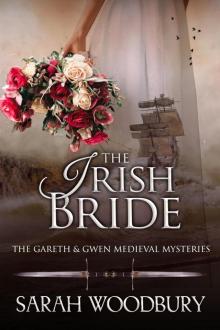 The Irish Bride
The Irish Bride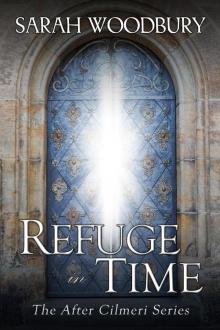 Refuge in Time
Refuge in Time Masters of Time
Masters of Time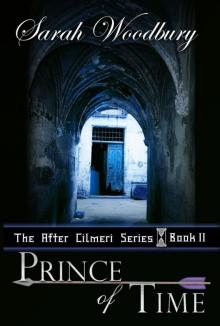 Prince of Time (Book Two in the After Cilmeri series)
Prince of Time (Book Two in the After Cilmeri series)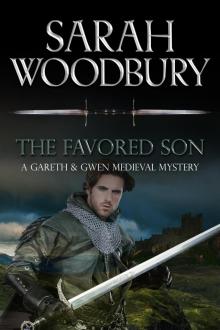 The Favored Son
The Favored Son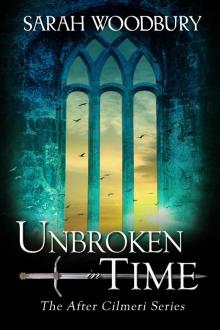 Unbroken in Time
Unbroken in Time![[The Lion of Wales 01.0] Cold My Heart Read online](http://i1.bookreadfree.com/i/03/22/the_lion_of_wales_01_0_cold_my_heart_preview.jpg) [The Lion of Wales 01.0] Cold My Heart
[The Lion of Wales 01.0] Cold My Heart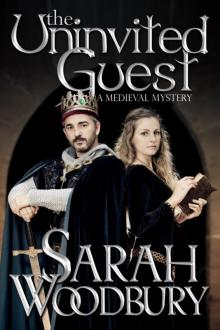 The Uninvited Guest
The Uninvited Guest The Pendragon's Blade (The Last Pendragon Saga Book 2)
The Pendragon's Blade (The Last Pendragon Saga Book 2)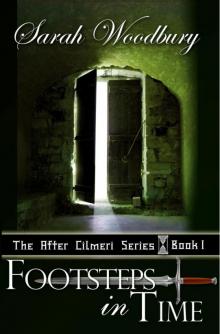 Footsteps in Time
Footsteps in Time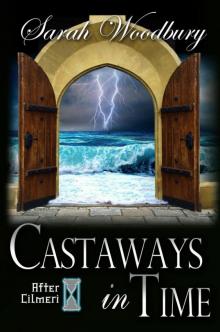 Castaways in Time (The After Cilmeri Series)
Castaways in Time (The After Cilmeri Series) Winds of Time
Winds of Time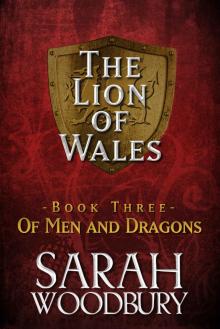 Of Men and Dragons (The Lion of Wales Book 3)
Of Men and Dragons (The Lion of Wales Book 3) Champions of Time
Champions of Time The Pendragon's Challenge (The Last Pendragon Saga Book 7)
The Pendragon's Challenge (The Last Pendragon Saga Book 7) Rise of the Pendragon (The Last Pendragon Saga Book 6)
Rise of the Pendragon (The Last Pendragon Saga Book 6) The Worthy Soldier
The Worthy Soldier The Last Pendragon (The Last Pendragon Saga Book 1)
The Last Pendragon (The Last Pendragon Saga Book 1) The Fallen Princess
The Fallen Princess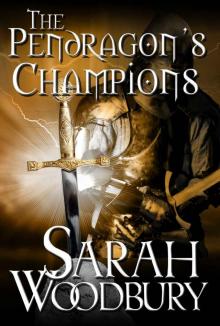 The Pendragon's Champions (The Last Pendragon Saga Book 5)
The Pendragon's Champions (The Last Pendragon Saga Book 5)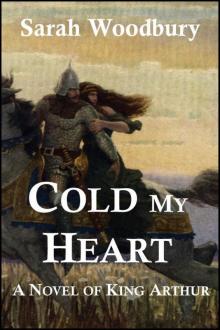 Cold My Heart: A Novel of King Arthur
Cold My Heart: A Novel of King Arthur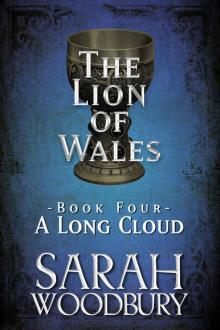 A Long Cloud (The Lion of Wales Book 4)
A Long Cloud (The Lion of Wales Book 4) Frost Against the Hilt (The Lion of Wales Book 5)
Frost Against the Hilt (The Lion of Wales Book 5) Daughter of Time: A Time Travel Romance
Daughter of Time: A Time Travel Romance Outpost in Time
Outpost in Time Shades of Time kobo
Shades of Time kobo The Pendragon's Quest (The Last Pendragon Saga Book 4)
The Pendragon's Quest (The Last Pendragon Saga Book 4) The Unexpected Ally
The Unexpected Ally Crossroads in Time (The After Cilmeri Series)
Crossroads in Time (The After Cilmeri Series)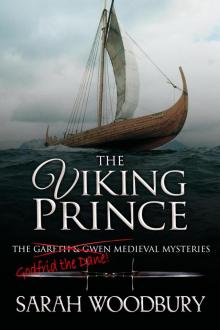 The Viking Prince
The Viking Prince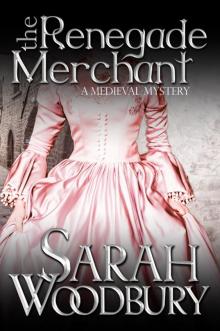 The Renegade Merchant
The Renegade Merchant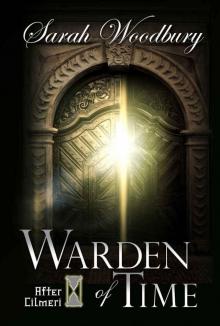 Warden of Time (The After Cilmeri Series Book 8)
Warden of Time (The After Cilmeri Series Book 8)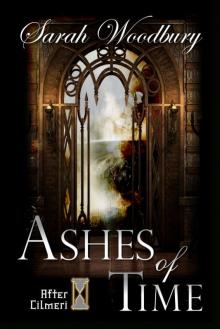 Ashes of Time (The After Cilmeri Series)
Ashes of Time (The After Cilmeri Series)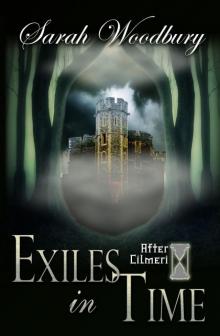 Exiles in Time (The After Cilmeri Series)
Exiles in Time (The After Cilmeri Series)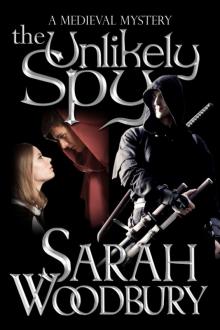 The Unlikely Spy
The Unlikely Spy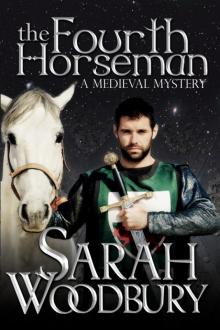 The Fourth Horseman
The Fourth Horseman The Oaken Door (The Lion of Wales Book 2)
The Oaken Door (The Lion of Wales Book 2) Song of the Pendragon (The Last Pendragon Saga Book 3)
Song of the Pendragon (The Last Pendragon Saga Book 3) Champions of Time (The After Cilmeri Series, #13)
Champions of Time (The After Cilmeri Series, #13) Guardians of Time
Guardians of Time The Bard's Daughter (A Gareth and Gwen Medieval Mystery)
The Bard's Daughter (A Gareth and Gwen Medieval Mystery)